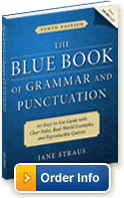|
Welcome to your GrammarBook.com E-Newsletter.

|
“The Blue Book of Grammar and Punctuation helps demystify the rules of punctuation which are so essential for effective written communication.”
—Helen M.
“Your site is one of the best! Thank you for giving the gift of knowledge!”
—John E.
“I adore everything about the website, from the simple, elegant design to the well-summarized content.”
—Farhan A.
|
|
|
I Subject, Your Honor
Last month, in discussions of who-whom and whoever-whomever, we passed along a handy memory aid: who (and whoever) = he; whom (and whomever) = him.
That’s fine as far as it goes, but it goes nowhere unless we can tell a subject (he) from an object (him).
One reason that distinguishing between subjects and objects is so difficult can be traced to what’s called the subject complement, a fancy term for the B in A = B. In the sentence It is you, the word you is a
subject complement: it = you.
Math teaches us that if A = B, then B = A. If it = you, then you = it. In the sentence It is you, the
word you is a kind of secondary subject.
However, you stays the same whether it’s a subject or an object. Things get trickier with the subject pronouns I, he, she, we, they, who, and whoever, which all change forms when they function as objects (me, him, her, us, them, whom, and whomever).
A conversational sentence like It’s me is technically wrong, because me is the object form of I, when what we need is a subject complement. Therefore, It’s I would be proper English (it = I). Remember, if It is I, then I am it. Since no one says, “Me am it,” It’s me can’t be correct.
Look at these everyday sentences: It’s us. Wait, it was him. No, it has been them all along. But it could’ve been her. We hear these all the time—and every one of them is technically incorrect. In such sentences, informal
speech tends to prefer object pronouns like me, her, and them over the formally correct I, she, and they. Who knows why? They just sound better, or something. For whatever reason, not many folks we meet on the street would say, “It’s
we.” “It was he.” “It has been they.” “It could’ve been she.”
But no one can ever master whom and whomever without knowing when object pronouns in everyday speech should be changed to subject
complements in formal English.
More next time…
Due to the E-Newsletter's large readership, please submit your English usage questions through GrammarBook.com's “Grammar Blog.” |
|
Pop Quiz
Make the following colloquial sentences consistent with formal English.
1. She’s just glad it turned out to be me.
2. The way I see it, it must have been them.
3. The culprits were Joe, Jack, Jake, and whomever else.
4. It ended up being her who the group could count on.
5. It seemed like them, but it was him.
Free BONUS Quiz For You!
[[firstname]], because you are a subscriber to the newsletter, you get access to one of the Subscription Members-Only Quizzes. Click here to take a Pronouns Quiz and get your scores and explanations instantly!

“So convenient...hundreds of quizzes in one click.”
[[firstname]], Subscribe to receive hundreds of English usage quizzes not found anywhere else!
- Take the quizzes online or download and copy them.
- Get scored instantly.
- Find explanations for every quiz answer.
- Reproduce the quizzes to your heart's content.
- EASY to use.
- No software to download.
- No setup time.
- A real person to help you if you have any questions!
“Fun to test my skills!” “The explanations really help...thanks!”
Your choice: Subscribe at the $29.95 or $99.95 level ($30 off - regularly $129.95).
“I download the quizzes for my students who don't have computer access.”
Subscribe today to receive hundreds of English usage quizzes not found anywhere else!
“Makes learning English FUN!”
 |
Don't need all the quizzes at once?
You can now purchase the same quizzes individually for ONLY 99¢ each. Purchase yours here. |

Get Yours Today!
Get Amazon’s #1 Bestseller in Four Categories!
#1 in Grammar
#1 in Reading
#1 in Lesson Planning
#1 in Vocabulary |
The Blue Book of Grammar
and Punctuation by Jane Straus
An indispensable tool for busy professionals, teachers, students, homeschool families, editors, writers, and proofreaders.
Now available in print AND as an e-Book! Over 2000 copies are purchased every month!
Order Your Copy Today!
- Hundreds of Grammar, Punctuation, Capitalization, and Usage Rules
- Real-World Examples
- Spelling / Vocabulary / Confusing Words
- Quizzes with Answers
|
View the entire contents online
Discounts available for schools, bookstores, and multiple copies. Order Today!
 Wordplay Wordplay
The following are purportedly real newspaper headlines. Further evidence that proofreading is a dying art?
Man Struck by Lightning: Faces Battery Charge
New Study of Obesity Looks for Larger Test Group
Astronaut Takes Blame for Gas in Spacecraft
Pop Quiz Answers
These answers are academically correct. But if you talk to your friends like this, you’re on your own.
1. She’s just glad it turned out to be I.
2. The way I see it, it must have been they.
3. The culprits were Joe, Jack, Jake, and whoever else.
4. It ended up being she whom the group could count on. (whom is the object of the verb count on)
5. It seemed like them, but it was he. (them is the object of the preposition like)
Learn all about who and whom, affect and effect, subjects and verbs, adjectives and adverbs, commas, semicolons, quotation marks, and much more by just sitting back and enjoying these easy-to-follow lessons. Tell your colleagues (and boss), children, teachers, and friends. Click here to watch. |





 Wordplay
Wordplay
